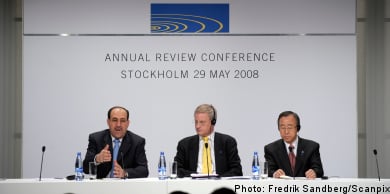“The participants of the Stockholm conference recognized the important efforts made by the (Iraqi) government to improve security and public order and combat terrorism and sectarian violence across Iraq,” the declaration said.
The statement, adopted by the some 100 delegations attending a follow-up meeting of the so-called International Compact with Iraq (ICI) conference in Stockholm, said that “given the difficult context, these successes are all the more remarkable.”
Going forward, the conference statement “encouraged the government of Iraq to make further progress in establishing an environment conducive to doing business,” and to prioritize “safeguarding the rights of women, minorities and other vulnerable groups.”
Following the meeting, Bildt explained that the conference was important. He believes that is shows a new level of international support for the stabilization of Iraq.
“Most of all is the Iraqis themselves who are moving forward. I think there have been a number of interesting conversations about the work of building up the government, of issues related to debt reduction, and about election laws ahead of the coming local and regional elections. Things seem to be moving forward,” he said to the TT news agency.
Bildt also pointed out that the most important thing about the conference was that it happened. He also viewed as realistic the suggestion by Iraqi Prime Minister Nuri al-Maliki that a follow up conference be held next year in Baghdad.
United Nations Secretary General Ban Ki-moon, who hosted the conference with the Iraqi Prime Minister, said he had come “to this meeting with one word in mind: ‘hope’ for the people and government of Iraq.”
“But leaving here this evening, I’m encouraged,” he told reporters at the end of the gathering, adding that the conference showed “Iraq enjoys the full support of the international community.”
Maliki meanwhile described the conference as “replete with optimism” and was a confirmation that “the Iraqi government has taken great strides forward.”
He acknowledged however that Iraqi demands for debt and sanctions dating back to Saddam Hussein’s regime to be cancelled had yet to be fully addressed.
“The overall objective of the Compact is to re-construct Iraq … to allow Iraq to emerge from its crisis,” he said, insisting that the country’s heavy burden of debt and sanctions “continue to pose obstacles and are part of the difficulties facing the Iraqi government.”
In the future, “we hope that this will be dealt with seriously,” he told reporters.
Ban said he believed the question of lifting Iraq’s wartime sanctions should be left up to the UN Security Council, but promised to use his position as UN chief to “try to help wherever I can.”
Maliki meanwhile stressed that Iraq was coming to grips with its security problems, insisting the country should host next year’s ICI follow-up in Baghdad.
While Ban cautioned that the situation in Iraq remained “fragile” he said “I’m quite confident that the Iraqi government will be able to hold this meeting next year, and I’m looking forward to attend.”


 Please whitelist us to continue reading.
Please whitelist us to continue reading.